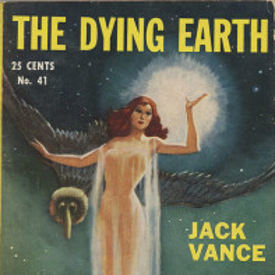Mainstream video games—the kinds that have massive advertising campaigns—have codified our genres. They’ve done this much like film has. There are superhero movies and science fiction tentpoles, much like there are fantasy RPGs or space action games.
These are enjoyable games, and they play well. But they lack what my preferred fiction has. My favorite works come from people like China Mieville: weird, off-kilter reinterpretations and re-imaginings of themes, laden with critical thought and odd turns. Ask me my favorite novel and I might give you Libreville’s The City and the City, a detective slash fantasy slash political thriller set in two cohabiting Eastern European cities.
Weird stuff, basically. Video games are short on weird stuff. We’ve got the intensely Japanese oddities of things like Hyperdimension Neptunia (where every character is a video game console for some reason), but not a lot of strange science fiction. Mass Effect and Skyrim are by the book interpretations. Even the weirder games—the Japanese Dark Souls and Devil May Cry games of the world—feel safe. They feel normal.
What exist, though, are delightful independent games that offer us strange realities. Dig deeper and you’ll find majestic oddities like Porpentine’s Howling Dogs, a free game of interactive fiction about living in the future.
Howling Dogs, at first blush, has more in common with hypertext fiction than with what you’d think of as a video game. And it’s true that your interaction with the fiction is exclusively clicking hyperlinks, with only a few transparent choices lurking underneath.
But Howling Dogs—a story about a person of indeterminate attributes living in a hospital perhaps prison experimenting with virtual reality—has a lot of what makes me enjoy science fiction: it’s exploring the ways human beings live in realities unlike our own. It’s nothing like my own life, and yet it’s close enough to draw parallels. It’s a story, or a collection of stories, in large part about cages, and while the author may have intended a specific reading of the work it’s a broad enough net to capture pretty much anyone’s imagination.
Howling Dogs represents another stage of a reclamation of sorts. In recent years video games have become narrow. They fit easily into boxes. When the medium was young, in the 80’s and 90’s, pretty much anything could have been a video game: we had no idea how the medium worked. Last week, on a whim, I played some Super Nintendo games, and I was amazed by how weird everything was. The developers of the original Shadowrun didn’t know how an RPG was supposed to work, how an adventure game happened, but they made a hybrid anyway. And you know what? It worked really well. There wasn’t a code for anything, so developers had to figure out how things worked for themselves. They had to author modes of expression.
By the mid 2000’s, though, everything was codified: games were action games, or first person shooters, or RPGs, and deviation was absurd. Even something like the immersive sim (think Deus Ex, or Thief) was pretty established: you wouldn’t think of making an immersive sim where you couldn’t shoot someone, or where you couldn’t pick the locks on a door. Even when indie games came into prominence (starting around 2007 with puzzle-platformer Braid) things stayed solid: genres might mix, but there was a proper way to mix them. You were informed by a decade of stoic traditionalism.
Modern games, however, have been moving away from video games being one thing into being a plethora of exciting novelties. That’s been the common thread between games I’ve highlighted so far: they all betray expectations. Starseed Pilgrim doesn’t fit into a video game genre: you’re growing a garden in space, and you’re discovering how to play this new experience as you go. Fez offers you one thing and gives you linguistic puzzles.
And Howling Dogs adopts a form traditionally used for interactive fiction—at least in video game mesosphere—and turns it on its head. It’s spawned criticism from games critics about whether or not its even a game, and that’s precisely the point: we don’t have to keep video games in cages. We can have games like The Wiki Game, and we can have Call of Duty, and we can have Deus Ex: Human Revolution, and we can have Howling Dogs and none of them take up each others places. They can all be exciting, in their own unique ways.
We can do so many more interesting things with video games than we thought. Howling Dogs is a start; no, it’s a point on the spectrum. It’s a fascinating one, definitely worth your time, and I can’t wait to see all the other points that emerge as more and more people make video games without spending half their lives wondering what they are and how they work.
Please take a moment to support Amazing Stories with a one-time or recurring donation via Patreon. We rely on donations to keep the site going, and we need your financial support to continue quality coverage of the science fiction, fantasy, and horror genres as well as supply free stories weekly for your reading pleasure.
https://www.patreon.com/amazingstoriesmag










